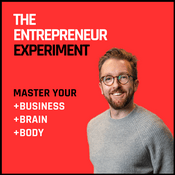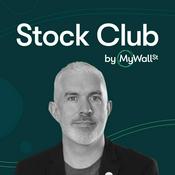122 episodes
- From overcoming initial anxieties through hackathons and playful experiments, to setting an ambitious organizational roadmap for AI, Dessalen Wood shares how Syntax is embedding artificial intelligence across departments, focusing on pragmatic progress rather than hype.
You’ll hear stories about driving excitement, learning by doing, and the all-important challenge of measuring real impact. More than just technology, this episode dives into the culture shifts, collaboration with IT, and leadership mindsets that are pushing companies out of their comfort zones and into the future, while keeping authenticity and humanity front and center.
You will want to hear this episode if you are interested in...
00:00 Overcoming AI fear through collaboration
03:30 Defining AI readiness today
09:55 AI's role in business transformation
15:46 AI anxiety in the workplace
22:05 Making AI adoption fun
28:11 AI expertise requires human touch
36:42 AI strategy: Three layers explained
41:31 True transformation vs. improvement
53:21 Rethinking work, technology, and AI
Overcoming AI Anxiety
Early stages of AI adoption in organizations are often marked by fear. Employees worry about being displaced, making mistakes, or failing to keep up. At Syntax, Dessalen Wood and her fellow leaders tackled these concerns by creating safe, engaging, and transparent opportunities to experiment.
One of the most effective strategies was an organization-wide AI hackathon. Everyone, regardless of their role, was invited to submit ideas for automation and improvement—ideas that the tech team then built. Not only did this demystify AI, but it also provided a healthy dose of competition and excitement. Dessalen describes that, “Instead of people fearing automation, it became a competition... People were saying, please, automate my tasks!” This shift from apprehension to enthusiasm helped break through adoption barriers and foster a culture of creative problem-solving.
Structuring Success: A Multi-Layered AI Roadmap
Syntax’s approach moves AI from a buzzword to a set of actionable strategies. The leadership distinguished between three core areas:
Department Initiatives: Leveraging AI for productivity and process improvement within teams
Customer Value: Enhancing solutions and services delivered to external clients
Business Transformation: Reimagining core business models and operations for strategic advantage
Many organizations mistakenly assume one AI initiative will magically improve all three—but real impact comes from tailored strategies for each. In practice, this means differentiating between continuous improvement (making existing tasks more efficient) and true reinvention (fundamentally transforming how and why work gets done).
The creation of AI champions, employees trained as internal advocates and solution designers, helped ensure that innovative ideas didn’t just sit in a backlog. Instead, those not ready for large-scale investment could be adapted, piloted, and iterated by these champions, keeping the spirit of experimentation alive while prioritizing resources for the highest-value initiatives.
The Human Element: Authenticity, Experimentation, and Measurement
As AI tools become more prevalent, a new challenge emerges: maintaining authenticity in communication, development, and leadership. The team discussed the “hollowed-out leader” phenomenon—where over-reliance on AI could dilute critical thinking and personal investment. Dessalen explains why expertise, context, and human customization are more important than ever: If it doesn’t demonstrate expertise and isn’t highly curated, it just turns people off.
Measurement is also evolving. Early wins in AI productivity are being tracked, not just in terms of completion rates or tool adoption, but in demonstrable business outcomes and stretch goals. Syntax uses tools that help employees articulate their productivity gains and set new impact targets, ensuring that activity translates into organizational value.
Resources & People Mentioned
Experience Qualtrics Management Resources
Connect with Dessalen Wood
Dessalen Wood on LinkedIn
Connect With Red Thread Research
Website: Red Thread Research
On LinkedIn
On Facebook
On Twitter
Subscribe to WORKPLACE STORIES - The way organizations think about artificial intelligence (AI) in the workplace has shifted dramatically over the past few years. While early conversations centered on isolated experiments and technological hype, organizations now face the much harder task of integrating AI into the fabric of how work gets done. We welcome Melissa Reeve, author of “Hyper Adaptive: Rewiring the Enterprise to Become AI Native,” to discuss what AI adoption really means for people, processes, and culture.
Melissa tackles some tough questions about organizational complexity, shifting operating models, and the critical role of culture and systems thinking in successful AI integration. Listeners will get candid advice on starting small, experimenting with purpose, and preparing for the rewiring ahead. You will want to hear this episode if you are interested in...
03:38 Integrating AI into organizations
12:47 AI Native enterprise structure
15:51 Dynamic AI governance framework
18:58 AI implementation foundations
23:56 Process mapping for AI integration
29:44 Balancing efficiency and leadership focus
37:02 Start small with value streams
40:59 Innovative organizational funding models
42:14 Starting a skills-focused organization
47:03 Digital Twins in Product Testing
Navigating the AI Revolution at Work
Melissa Reeve’s journey began on the factory floors of Toyota, learning firsthand how small process shifts can drive system-wide change. Building on years of research and influence from Lean, Agile, and DevOps practitioners, Reeve authored a five-stage maturity model she calls hyperadaptive, designed to guide organizations through the incremental steps needed to become truly AI-native.
The five stages of Melissa's model:
Foundation – Build organizational understanding of AI; create dynamic governance structures and clarify guardrails.
Optimization – Identify and optimize business processes for AI interactions; move beyond basic experimentation.
Agents & Automation – Develop and manage AI agents that execute tasks and processes autonomously.
Rewiring – Shift organizational architecture from rigid hierarchies to flexible, value-stream teams funded and incentivized differently.
Hyperadaptive – Fully sense-and-respond organizations capable of real-time adaptation.
Melissa splits these into two main categories: Basecamp (the first three stages, where most companies currently operate) and the Emerging Frontier (rewiring and hyper adaptivity).
Why Organizations Struggle with AI Integration
According to Melissa, most organizations are stuck because they underestimate the support structures required for successful AI adoption. It’s not just about updating technology, in fact, 70-80% of AI success depends on people, culture, and processes, not algorithms. Companies often rush to deploy AI agents or experiment without a clear North Star, leading to pilot fatigue and an 80% failure rate. Many organizations haven’t even finished laying the foundational groundwork, such as establishing unified governance or mapping work processes.
Another common pitfall is the tendency to try everything at once. Pressure for fast results drives teams to bite off too much, resulting in burnout and costly errors.
Moving from Experimentation to Purposeful Transformation
Playing with AI is not a strategy. While experimentation is necessary, organizations must put bounds on these efforts, know why they're experimenting, what hypothesis they're testing, and what success will look like.
One necessary precursor is getting to grips with how your organization actually works. Many leaders lack visibility into workflows, decisions, and skillsets, making process optimization difficult. Reeve suggests collaborative process mapping—sometimes supported by AI tools—to unlock tacit knowledge and identify where AI can augment or reinvent workflows.
Organizing Around Value Streams
One of the most transformative elements is the shift from function-based silos to cross-functional value stream teams. Melissa draws on examples from Toyota, Zappos, and Unilever—organizations that reimagine workflows, funding mechanisms, and team incentives to deliver value rather than preserve hierarchy. Dynamic budgeting, focused experimentation, and flexible team structures help organizations scale AI success without tearing up everything at once.
Culture, Upskilling, and Durable Success
AI’s impact will be decided by how well organizations invest in people. Unilever’s Future Fit program exemplifies this approach, aligning reskilling efforts to individual purpose and business needs. It’s not algorithms that set successful organizations apart, but their ability to create cultures and support systems that empower people to adapt, reinvent themselves, and thrive amidst change.
Start small, experiment with purpose, invest in support structures, and prepare to rewire not just technology, but how your organization thinks about work itself. AI may be the catalyst, but people, empowered and organized around value, are the key to lasting transformation.
Resources & People Mentioned
Hyperadaptive: Rewiring the Enterprise to Become AI-Native
Connect with Melissa Reeve
Melissa M. Reeve on LinkedIn
Connect With Red Thread Research
Website: Red Thread Research
On LinkedIn
On Facebook
On Twitter
Subscribe to WORKPLACE STORIES Reimagining Work at Scale: Manuel Smukalla on Skills, Dynamic Shared Ownership, and the Future of Bayer
21/1/2026 | 58 mins.Manuel Smukalla, Global Talent Impact, Skills Intelligence, and Systems Lead at Bayer, joins Workplace Stories to unpack one of the most ambitious organizational transformations underway today. As Bayer confronts significant market, legal, and profitability pressures, the company has taken a radically different approach to how work, leadership, and talent are structured, rethinking everything from management layers to career progression.
In this episode, Manuel walks through Bayer’s shift to Dynamic Shared Ownership (DSO), a decentralized operating model built around networks of teams, 90-day work cycles, and leaders who coach rather than control. He explains why skills visibility became a foundational requirement for this model to work and how Bayer is using skills data to democratize opportunities, improve talent flow, and fundamentally rethink careers inside a global enterprise.
You’ll hear how Bayer reduced management layers by more than half, redesigned leadership expectations through its VAC (Visionary, Architect, Catalyst, Coach) model, and moved toward a culture where employees are empowered, and expected, to own their work, development, and impact.
You will want to hear this episode if you are interested in...
[01:01] Why Bayer embarked on a radical organizational transformation.
[04:30] What Dynamic Shared Ownership really means in practice.
[06:55] Moving from hierarchical structures to networks of teams.
[10:40] Why skills visibility became a critical business problem.
[14:05] How 90-day work cycles change accountability and outcomes.
[18:10] Building organizations around customer problems, not functions.
[21:15] Launching skills profiles as a starting point, not an endpoint.
[23:00] How Bayer’s talent marketplace democratizes opportunity at scale.
[27:00] The three pillars of a skills-based organization.
[33:00] Rethinking careers, performance management, and feedback.
[43:10] The VAC leadership model explained.
[52:30] Measuring success in a decentralized organization.
[53:45] Advice for organizations considering similar transformations.
Dynamic Shared Ownership: Redesigning How Work Gets Done
At the core of Bayer’s transformation is Dynamic Shared Ownership, an operating model that replaces traditional hierarchies with flexible networks of teams. Manuel explains how Bayer reduced its management layers from thirteen to six and reorganized work into 90-day cycles focused on clear outcomes. After each cycle, teams reflect on what worked, what didn’t, and whether the work should continue at all.
This approach decentralizes decision-making and forces a shift away from command-and-control leadership. Leaders are no longer expected to direct every task; instead, they create the conditions for teams to succeed, setting direction while trusting teams to determine how outcomes are achieved.
Skills as the Engine of Talent Flow
For Dynamic Shared Ownership to function, Bayer needed a new way to understand and deploy talent. Manuel shares a pivotal realization: managers were turning to LinkedIn to understand employee skills because the organization lacked internal visibility. That insight sparked Bayer’s skills journey.
Rather than starting with complex taxonomies, Bayer focused first on skill visibility. Employees created and maintained skills profiles, supported by workshops on how to describe capabilities effectively. Over time, this evolved into a talent marketplace that matches people to work based on skills, not job titles, career level, or location, helping democratize access to opportunities across the enterprise.
Moving Talent to Work, Not Work to Talent
Manuel outlines three defining pillars of a skills-based organization. First, talent must move to work rather than work being constrained by static roles. Second, organizations must commit to permanent upskilling, recognizing that development is continuous, not episodic. Third, opportunities must be democratized at scale, reducing reliance on manager sponsorship or informal networks.
Bayer’s marketplace supports fixed roles, flex roles, and fully agile project-based work, encouraging employees to actively shape their careers while remaining accountable for outcomes. This model challenges long-held assumptions about promotions, ladders, and linear advancement.
Leadership and Performance in a Decentralized World
Leadership at Bayer has been redefined through the VAC model: Visionary, Architect, Catalyst, and Coach. Leaders set direction, help teams design how value is created, remove barriers, and support rapid cycles of learning. This requires significant unlearning for leaders shaped by traditional hierarchies.
Performance management has also shifted. Goals are set in 90-day cycles at the team level, with feedback coming from peers and work leads rather than solely from a direct manager. Over time, this creates richer data on contribution and impact, but also demands a cultural shift toward transparency, shared accountability, and continuous feedback.
Connect with Manuel Smukalla
Manuel Smukalla on LinkedIn
Connect With Red Thread Research
Website: Red Thread Research
On LinkedIn
On Facebook
On Twitter
Subscribe to WORKPLACE STORIESCentralizing for Strategy: Christine Crouch on L&D Transformation at General Mills
17/12/2025 | 52 mins.Christine Crouch, Senior Director of Learning at General Mills, joins Workplace Stories to discuss a massive shift in how one of the world's legacy food companies approaches talent development. General Mills has recently transitioned to a centralized and integrated learning model.
In this episode, Christine lays out one of the clearest cases for centralization we have heard. While efficiency is a benefit, she argues that the true drivers are decision-making power and better data. By unifying the function, General Mills gains a stronger view of learning activity and business needs, creating the strategic infrastructure necessary for the future of work.
You’ll hear how Christine’s team manages to be centralized without losing the "local feel" through a robust Learning Business Partner model. She also details how centralization unlocks the ability to correlate learning metrics with talent outcomes like retention and performance. Finally, Christine shares her philosophy on AI, not as a replacement for human connection, but as a tool to elevate the human side of learning.
You will want to hear this episode if you are interested in...
[06:07] Background on General Mills and its culture.
[07:00] The shift from decentralized to centralized L&D.
[11:11] How to make centralization feel local to business stakeholders.
[18:30] The Learning Business Partner model explained.
[21:07] Correlating learning metrics with talent outcomes.
[27:58] Managing "rogue purchases" in a centralized model.
[34:20] Why AI will elevate, not replace, the human side of learning.
[47:35] Piloting AI coaching tools like "Nadia".
The Strategic Case for Centralization
For many organizations, the move to centralize L&D is purely a cost-cutting exercise. However, Christine frames the shift at General Mills as a play for better data and strategic decision-making. A centralized function provides a unified view of the organization's needs, allowing L&D to prioritize investments that drive enterprise-wide capabilities rather than just solving isolated functional problems. As AI accelerates, this strong data infrastructure is what will allow the organization to distinguish between what people actually need to know versus what can be offloaded to technology.
The Learning Business Partner Model
Centralization often brings the fear of losing touch with the business. General Mills solves this through the "Learning Business Partner" role, individuals who sit on the leadership teams of specific functions or segments but report back to the central L&D organization. These partners act as a bridge; they understand the HR strategy and business plans of their specific function while ensuring continuity with the broader enterprise goals. They are expected to be performance consultants first, identifying the root problems to solve rather than just taking orders for training.
AI: Elevating the Human Element
Christine’s approach to AI is grounded in optimism and human-centricity. She believes AI will not replace the human side of learning but elevate it. General Mills is actively piloting AI for tasks like personalization, automation, and coaching via a tool called "Nadia," which acts as an "always-on" coach. However, Christine emphasizes that deep skill building, like change leadership, still requires human connection, peer discussion, and the ability to "read the room," skills that AI cannot fully replicate.
Connect with Christine Crouch
Christine Crouch on LinkedIn
Connect With Red Thread Research
Website: Red Thread Research
On LinkedIn
On Facebook
On Twitter
Subscribe to WORKPLACE STORIES- On the latest episode of Workplace Stories, we sit down with Koreen Pagano, author of "Building a Skills-Based Organization," to talk about one of the hottest and most complex topics in the world of work: how organizations can become truly skills-based, and what that really means in today’s rapidly changing, AI-driven landscape. The conversation was loaded with practical insights, candid stories, and wisdom from the front lines of workforce transformation.
Koreen shares her journey from ed-tech and product leadership to guiding hundreds of organizations through the maze of skills transformation. We discuss the crucial front-of-house and back-of-house elements, from clear communication and partnership models to building the right data and technology infrastructure. You’ll hear fresh perspectives on using skills data as an early signal for retention, the shifting role of tasks versus skills, and what it means to future-proof your workforce for ongoing change.
You will want to hear this episode if you are interested in...
[05:17] Skills vs job architecture approaches.
[10:04] Navigating skills-based organizations.
[14:33] Workforce data challenges with AI.
[23:04] Skills over jobs for strategy.
[27:04] Building resilient data systems.
[34:33] Building trust in skill data.
[39:32] Predicting employee retention through data.
[45:59] Helping organizations align AI transformation with business goals.
Why Skills Still Matter in a “Task-Talk” World
There’s a persistent misconception that the age of “skills” has passed and that “tasks” offer a more practical lens, especially with AI in play. Koreen shares how, at a recent industry event, she heard professionals say, “We don’t need to worry about skills, we have to focus on tasks.” But she thinks that it’s misguided to abandon skills just when organizations are barely starting to understand and leverage them.
While tasks describe the work to be done, skills reflect the underlying human (and sometimes machine) capabilities that make that work possible. Both are crucial, but without a foundational understanding of your organization's skills, mapping tasks is like building on sand.
Front of House, Back of House, and Getting Skills Right
We need to balance “front of house” and “back of house” considerations when building a skills-based organization. Organizations often focus either on external communications, partnerships, and culture (front of house), or purely on technology, data, and infrastructure (back of house), but rarely both. Koreen is unique in straddling the two, and it’s this holistic approach, blending people and process with tech and data, that sets successful organizations apart.
The Evolution of Data and the Rise of Skills Verification
Organizations are beginning to realize that their skills data isn’t just about upskilling or reskilling; it’s tightly connected to business-critical outcomes like retention, performance, and the ability to adapt to market shifts. Koreen shares compelling examples of using skills data to provide early warning on issues like employee retention, demonstrating data-driven HR in action.
She also shared her pragmatic “3Vs” model for validating skills data: Validity (how well the data measures what it claims to), Variety (different types of data from varied sources), and Volume (quantity and frequency of data collected). You can make solid business decisions with basic self-reported skills data, but for higher-stakes calls, like hiring, you need much more rigorous, validated information.
Jobs, Skills, and the Trap of Static Structures
Often, organizations anchor their skills strategy to their job architecture. Consultants and technology vendors frequently push companies to start by mapping skills to static jobs. We discuss why this is a dangerous place to “end”, because jobs, roles, and the tasks that define them are changing faster than ever, especially with AI in the mix. Koreen advocates for designing skills data that is flexible, lives independently, and can be mapped to jobs and tasks as they evolve, never becoming held hostage by legacy structures.
Goals Over Tasks
Perhaps the most powerful call to action was the need to focus less on micromanaging the “how” (a long list of tasks) and more on the “what and why”, the goals, outcomes, and genuine business objectives. In a future where work is constantly shifting, organizations that empower people around purpose, supported by dynamic skills data, will outperform those stuck mapping today’s tasks to yesterday’s job charts.
Building a skills-based organization isn't a project with a tidy endpoint, it’s a transformation. As Koreen reminds us, it’s hard, messy, and as much about culture as it is about data. But for the organizations (and the people) willing to experiment, adapt, and keep skills at the center of strategy, the payoff is a workforce that’s ready for whatever comes next.
Resources & People Mentioned
Building the Skills-Based Organization: A Blueprint for Transformation by Koreen Pagano
Connect with Koreen Pagano
Koreen Pagano on LinkedIn
Connect With Red Thread Research
Website: Red Thread Research
On LinkedIn
On Facebook
On Twitter
Subscribe to WORKPLACE STORIES
More Business podcasts
Trending Business podcasts
About Workplace Stories by RedThread Research
Workplace Stories is a podcast for HR and people leaders who are tired of noise and need clarity that actually holds up. It is hosted by Stacia Garr and Dani Johnson of RedThread Research.Each episode features candid conversations with practitioners, thinkers, and executives who are navigating real decisions inside complex organizations. Not hypotheticals. Not vendor promises. Real tradeoffs, real experiments, and real lessons learned along the way.You’ll hear how leaders are making sense of skills, AI, organizational design, and culture when there’s no clear playbook and pressure to show progress is high. The focus is always the same: what’s actually working, what isn’t, and what leaders are doing next.Workplace Stories helps you make sense of complexity, build credibility with evidence, and move from ideas to action with more confidence.Want to be part of the conversation? Join our community for free and connect with others shaping the future of work.Learn more about RedThread Research here: https://redthreadresearch.com/home
Podcast websiteListen to Workplace Stories by RedThread Research, Money Talks and many other podcasts from around the world with the radio.net app

Get the free radio.net app
- Stations and podcasts to bookmark
- Stream via Wi-Fi or Bluetooth
- Supports Carplay & Android Auto
- Many other app features
Get the free radio.net app
- Stations and podcasts to bookmark
- Stream via Wi-Fi or Bluetooth
- Supports Carplay & Android Auto
- Many other app features


Workplace Stories by RedThread Research
Scan code,
download the app,
start listening.
download the app,
start listening.




































